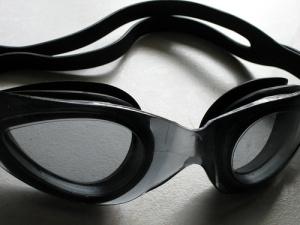
So last week, I decided to go swimming after like a 5-year hiatus. Yeah, I blame my ever-increasing waistline.
I’m the kind of guy who needs to wear goggles – I don’t get how people can open their eyes underwater and not get blinded by all the crap that’s in there. Anyways, I couldn’t find my old pair of goggles, so I decided to pick up a pair from this ratty little store (which was inexplicably blasting Flo-Rida songs at 10 in the morning) before driving to the pool.
The goggles were cheap, somewhere to the tune of 2 bucks. I drove away from the store feeling like I got a helluva bargain.
The first thing I noticed was that the straps were ridiculously hard to adjust. Describing them as “tight” was an understatement – it would’ve taken a brain surgeon with tweezers and a microscope to undo them. Also, they were really low-quality. I would have been able to make a better goggle strap with a pair of rubber bands.
I decided to just screw it and force them onto my head, making my skull feel like it was slowly being crushed by a boa constrictor. Also, the goggles were leakier than the Titanic. By the time I’d done half a lap, there was a complete ecosystem of coral life in front of my eyes. On the bright side, I was learning how to open my eyes in water.
After about 2 laps of swimming with a constricted head and water-filled eyes, I felt dizzy so I stopped and pulled the goggles off. And then one side of the goggles just COMPLETELY FELL OFF. I couldn’t believe it – my goggles were disintegrating before my very eyes.
I had enough. I got out of the pool, threw my goggles in the bin, and went home in disgust. I’d done a grand total of 2 laps.
Three lessons I’ve learnt from this episode:
- Never trust any store that plays Flo-Rida songs at 10 in the morning.
- Cheap doesn’t necessarily mean good. Always do your research before you buy, and opt for long-lasting and high-quality even if it costs a little more. (However, some people may misread this and automatically assume that “expensive = good”. This isn’t necessarily true either especially when it comes to unit trusts, mutual funds, financial advisers and ETFs).
But really, the most important lesson would be:
3. Always strive for high-quality.
It’s often tempting for me to rush through a to-do list by doing the bare minimum for each task. But I’ve always found that it’s usually a bad idea – the work gets compromised, my boss tells me to do it again, and it becomes the equivalent of a pair of crappy rubber-band-boa-constrictor-leaky goggles.
Instead, I’ve come to approach work in a totally different manner these days by just focusing on just three important tasks a day: two tasks in the morning, a slot to answer emails after lunch, and then one last task till the end of the day.
That really helps me to zero in my focus on what’s truly important, allowing me to really kick ass to produce the highest quality work I can offer. I do this even if it takes a little longer to accomplish ‘em. The downside is that I don’t get to complete a lot of my other, less important, tasks, but I’ve found that they usually take care of themselves after awhile

It doesn’t just apply to work – I’m trying to approach the blog and the book in the same way too. That’s why I take a whole week to write a blog post. That’s why I’m spending hours and hours researching on nuances just to write one paragraph in the book. That’s why I have hour-long conversations with friends to test ideas out. My goal is to make it so absolutely freakin’ awesome that it would easily trump the pants off any other personal finance book out there.
So I encourage you to do the same. If you’re going to do something – a report for your boss, a product for your customers, or a gift for a friend, make it high-quality. Don’t worry if it takes a little longer – that extra hour you take to craft it will be totally worth it. Start forming the habit to NEVER settle for mediocrity.
As Faith Jegede proclaims in this awesome TED talk, “The pursuit of normality is the ultimate sacrifice of potential. The chance for greatness, for progress, and for change, dies the moment we try to be like someone else.”
Never settle for “normal”. Get out there, and create something amazing.
